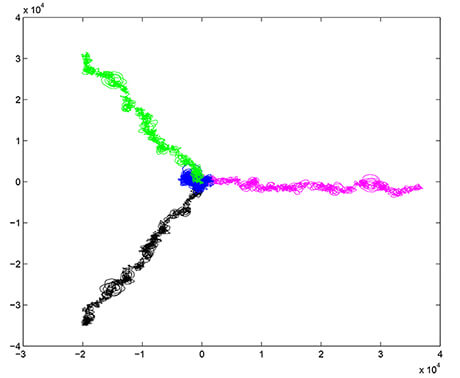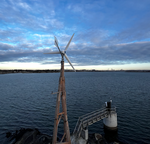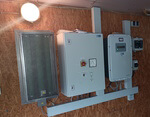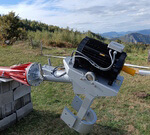New method for monitoring and diagnosing wind turbine faults
Previously, wind turbine monitoring and fault diagnosis have used detailed models or data-driven methods. This has placed significant demands on the model or data, which had to reflect the normal situation extremely accurately in order to detect irregularities—just as it can be very difficult to use these methods for identifying the location of a possible fault on the wind turbine.
A new method developed by Associate Professor Henrik Niemann’s research team from DTU Electrical Engineering, as well as DTU Compute and DTU Wind Energy makes it possible to both monitor the wind turbine while simultaneously establishing the location of any wear or fault, as well as the nature of the fault.
“We use data from sensors positioned at the point where the wind turbine blade is attached to the axis. There are two torque sensors on each blade. These are sensors which are already found on newer wind turbines in order to monitor the blade load. A wind turbine has three blades, so this provides three sets of measurements in total. We collect the data and then conduct a simple signal analysis. If the turbine is functioning as it should, the picture from the measurements will be completely symmetrical, whereas there will be fluctuations if there is a fault on one of the three blades,” explains Henrik Niemann from DTU Electrical Engineering.
The measurements not only provide information on whether there is a fault with the wind turbine, but also the location and nature of the fault.
“Different kinds of faults can crop up on wind turbine blades. It may be a fault with one of the sensors such as bias, where the sensor measures incorrectly. Or there might be a blade fault, for example a crack in the material which can lead to an ingress of water. Or it might be an actuator fault, which might mean that a blade is being incorrectly pitched. With our new method, it is possible to clarify where the fault is on the wind turbine, which then makes it simpler to repair,” says Henrik Niemann.
Method ready for testing in the real world
The new method will be highly attractive in terms of both wind turbine monitoring and, not least, because it makes it possible to know in advance where errors and wear and tear are about to occur. Maintaining wind turbines is resource-intensive, and it is important to remedy any wear and tear and poor functionality when the service technicians have, for example, sailed out and climbed to the top of the installations.
This method is very simple, and as like other big inventions, developing this new monitoring method happened slightly by chance.
“We were working on a project in which we developed a traditional model for monitoring wind turbines. However, when one researcher was replaced by another in the course of the project, some of the previous data had to be looked at afresh. We therefore started again to perform transformations of the data for using in the model, and discovered that they were sufficient to identify both the existence, type, and location of faults using the turbine’s own symmetry,” explains Henrik Niemann.
The new method has been thoroughly tested in the laboratory, and is now ready to be tested in the field. In this connection, the researchers have been in contact with several different wind turbine manufacturers.

Illustration: Data after the signal processing of a wind turbine without any faults (blue field) and data from three different measurements, where in each case there was a fault on one of the three different blades.
- Source:
- DTU
- Author:
- Press Office
- Link:
- www.dtu.dk/...
- Keywords:
- DTU, research, monitoring, blades, turbines


























